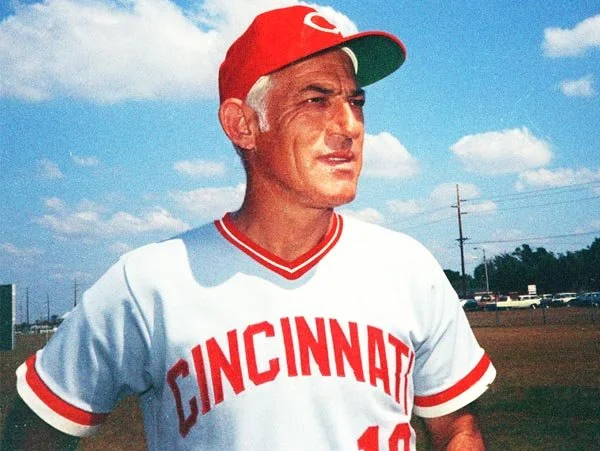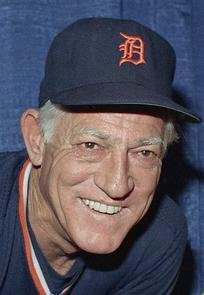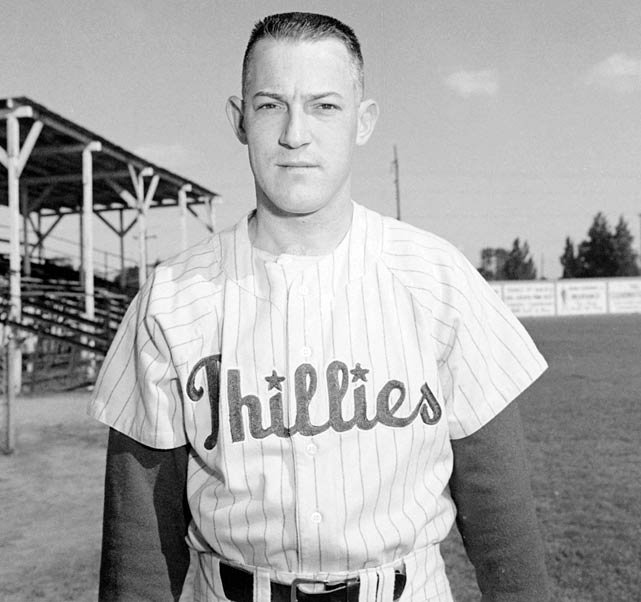Legend Geroge “Sparky” Anderson
Professional Baseball Manager | 2007 INDUCTEE
George “Sparky” Anderson was born on February 22, 1934, in Bridgewater, SD. When George was only 8, his family moved to Los Angeles, CA. George loved baseball and he played on amateur and minor league teams early in his life. In 1953, he got his big break and was signed to play for a major league team – the Philadelphia Phillies. However, he wasn’t great and only played one season.
You might think Sparky would give up on baseball...but he didn’t. He was eventually offered a baseball manager's job and realized he was a better manager than a player.
Sparky and his team, the Cincinnati Reds, won two World Series championships, one in 1975 and another in 1976. Next, he was asked to be the manager for the Detroit Tigers, and in 1984, the team won the World Series. He was also awarded Manager of the Year two times.
Sparky’s Early Years
George “Sparky” Anderson fell in love with baseball at an early age and started his career as a batboy for the University of Southern California Trojans.
He played baseball during his high school years and went on to play in the Minor Leagues and eventually played one year in the Major Leagues for the Philadelphia Phillies.
In 1955, a radio announcer gave him the nickname Sparky for his feisty play.
Sparky Anderson Played in the Minor and Major Leagues
Minor League - Class A Pueblo Dodgers – 1954
Minor League - Class AA Fort Worth Cats - 1955
Minor League - Class AAA Montreal Royals & Toronto Maple Leafs - 1957
Major League - Philadelphia Phillies - 1958
After playing in the Major Leagues for only one year, Sparky was sent back to the Minor Leagues where he played four more years. This turned out to be great for Sparky because the owner of the team, Jack Kent Cooke, noticed he had great leadership characteristics and was also good at helping new players improve their skills. Jack offered Sparky his first manager job and the rest is history!
Sparky Anderson – Baseball Hall of Fame Biographies
A Brief Biography about Former Reds and Tigers Hall of Fame Manager Sparky Anderson
interview with Sparky Anderson just before the former Tigers manager was inducted into the Baseball Hall of Fame
World Series Wins
-
World Series Wins -
1975
Reds defeat Red Sox
4-3
1976
Reds defeat Yankees
4-0
1984
Tigers defeat Padres
4-1
Sparky Anderson’s Hall of Fame Speech
Sparky managed some of baseball’s greats, including Johnny Bench, Pete Rose, and Ken Griffey Sr.
Former Cincinnati Reds star Pete Rose said, “Sparky was, by far, the best manager I ever played for. He understood people better than anyone I ever met. His players loved him, he loved his players, and he loved the game of baseball. There isn’t another person in baseball like Sparky Anderson. He gave his whole life to the game.” (Tampa Bay Times, 2010)
Fun Facts:
Sparky was the …
First manager to win 100 games in both leagues
First manager to win 600 games in both leagues
When asked what he treasured most about going into the Baseball Hall of Fame, Sparky replied, “I’m going to be the first South Dakotan (to be enshrined at Cooperstown).”
Reflection:
Although Sparky Anderson did meet his goal of playing professional baseball in the Major Leagues when he played 2nd base for the Philadelphia Phillies in 1959, he only spent that one season in the Major Leagues and was sent back to the Minor Leagues where he played four more years.
How do you think Sparky felt when his dream of playing in the Major Leagues for many years did not happen?
Sparky did not pursue becoming a baseball manager, so how did this happen?
What does the way Sparky became a baseball manager tell you?
What leadership characteristics did Sparky Anderson possess?
After learning about Sparky Anderson, why do you think he had success as a Major League baseball manager?
In the Sparky Anderson Biography video, Al Kaline who played for the Detroit Tigers under Sparky, said: “He’s even a better human being than he was a manager, and that’s hard to be.”
What do you think Mr. Kaline meant?












